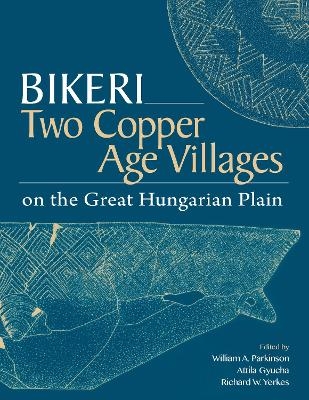
Bikeri
Two Early Copper-Age Villages on the Great Hungarian Plain
Seiten
2022
Cotsen Institute of Archaeology at UCLA (Verlag)
978-1-950446-16-2 (ISBN)
Cotsen Institute of Archaeology at UCLA (Verlag)
978-1-950446-16-2 (ISBN)
- Titel nicht im Sortiment
- Artikel merken
This book describes the multi-disciplinary research of the Körös Regional Archaeological Project in southeastern Hungary. Centred around two Early Copper Age villages in the Great Hungarian Plain, the research incorporated excavation, surface collection, geophysical survey and soil chemistry to investigate settlement layout and organization.
This edited book describes the multi-disciplinary research conducted by the Körös Regional Archaeological Project in southeastern Hungary from 2000-2007. Centred around two Early Copper Age Tiszapolgár culture villages in the Körös Region of the Great Hungarian Plain, Vészto-Bikeri and Körösladány-Bikeri, the research incorporated excavation, surface collection, geophysical survey and soil chemistry to investigate settlement layout and organization.
The transition from the Neolithic period to the Copper Age in the northern Balkans and the Carpathian Basin was marked by significant changes in material culture, settlement layout and organization, and mortuary practices that indicate fundamental social transformations in the middle of the fifth millennium BC. Prior research into the Late Neolithic of the region focused almost exclusively on fortified 'tell' settlements. The Early Copper Age, by contrast, was known primarily from cemeteries such as the type site of Tiszapolgár-Basatanya.
The Project’s results yielded the first extensive, systematically collected datasets from Early Copper Age settlements on the Great Hungarian Plain. The two adjacent villages at Bikeri, located only 70 m apart, were similar in size, and both were protected with fortifications. Relative and absolute dates demonstrate that they were occupied sequentially during the Early Copper Age, from ca. 4600-4200 cal B.C. The excavated assemblages from the sites are strikingly similar, suggesting that both were occupied by the same community. This process of settlement relocation after only a few generations breaks from the longer-lasting settlement pattern that are typical of the Late Neolithic.
This edited book describes the multi-disciplinary research conducted by the Körös Regional Archaeological Project in southeastern Hungary from 2000-2007. Centred around two Early Copper Age Tiszapolgár culture villages in the Körös Region of the Great Hungarian Plain, Vészto-Bikeri and Körösladány-Bikeri, the research incorporated excavation, surface collection, geophysical survey and soil chemistry to investigate settlement layout and organization.
The transition from the Neolithic period to the Copper Age in the northern Balkans and the Carpathian Basin was marked by significant changes in material culture, settlement layout and organization, and mortuary practices that indicate fundamental social transformations in the middle of the fifth millennium BC. Prior research into the Late Neolithic of the region focused almost exclusively on fortified 'tell' settlements. The Early Copper Age, by contrast, was known primarily from cemeteries such as the type site of Tiszapolgár-Basatanya.
The Project’s results yielded the first extensive, systematically collected datasets from Early Copper Age settlements on the Great Hungarian Plain. The two adjacent villages at Bikeri, located only 70 m apart, were similar in size, and both were protected with fortifications. Relative and absolute dates demonstrate that they were occupied sequentially during the Early Copper Age, from ca. 4600-4200 cal B.C. The excavated assemblages from the sites are strikingly similar, suggesting that both were occupied by the same community. This process of settlement relocation after only a few generations breaks from the longer-lasting settlement pattern that are typical of the Late Neolithic.
| Erscheinungsdatum | 16.01.2021 |
|---|---|
| Reihe/Serie | Monumenta Archaeologica |
| Zusatzinfo | Illustrated throughout |
| Verlagsort | Los Angeles |
| Sprache | englisch |
| Maße | 222 x 285 mm |
| Gewicht | 1616 g |
| Themenwelt | Geisteswissenschaften ► Archäologie |
| Geschichte ► Allgemeine Geschichte ► Vor- und Frühgeschichte | |
| ISBN-10 | 1-950446-16-6 / 1950446166 |
| ISBN-13 | 978-1-950446-16-2 / 9781950446162 |
| Zustand | Neuware |
| Informationen gemäß Produktsicherheitsverordnung (GPSR) | |
| Haben Sie eine Frage zum Produkt? |
Mehr entdecken
aus dem Bereich
aus dem Bereich
Was Pompeji über uns erzählt
Buch | Hardcover (2023)
Propyläen (Verlag)
32,00 €
auf den Spuren der frühen Zivilisationen
Buch | Hardcover (2023)
C.H.Beck (Verlag)
20,00 €


